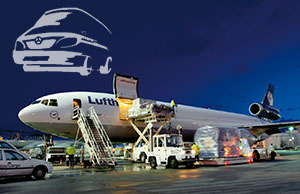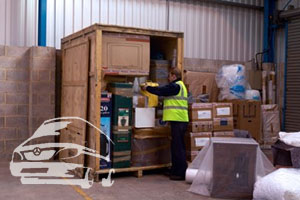Removals – Facilitating Migration
Posted by Jerrard Romanoff in Guides, on May 22, 2015There have been many human migrations throughout history. Starting with the Great Human Migration fifty thousand years ago, to the economic migration patterns of today. Migration of people from one geographical location to another is driven by a wide range of factors and reasons, generally though individuals move in search of a better life. In modern times people, especially in western countries move around a lot, particularly when it comes to employment and carrier opportunities. Relocating to a new town, city, state or country is a form of migration itself. Whether economic or other is determined by the particular circumstances.
People have moved to another location for work for thousands of years. Economic migration is perhaps one of the oldest forms of this phenomenon. Since introducing the monetary system, people from all across the world have been moving in order to secure (higher paid) employment and achieve better quality of life. In modern times, migration to distant locations, far from the individual’s home country is not uncommon. In the past, people who wanted to move to another country for instance, were limited by the sheer distance and the physical transport means of getting there (leaving out any political or administrative barriers). Nowadays, migration is limited by political and administrative specifics rather than lack of transportation means. Getting from A to B in the modern world has become much easier, quicker and more efficient. Less than a hundred years ago, there was no such thing as commercial aviation, people travelled by ship across the sea for months on end (going to Australia or New Zealand for instance). The introduction and mass use of modern transportation like airplanes and high speed trains for example, has made traveling, and in turn migration, a much more common occurrence.
 As mentioned earlier, people move around quite a lot these days. Whether one moves to another city within the same country to continue working the same job, or goes overseas to look for other means of employment, or simply wishes to live and work in another country, are all valid and popular reasons for migration in modern times. Migrating is not easy, leaving behind familiar sites, language, custom and culture can take its toll on people. On the same note, the world has become a so called global village, where people from all sorts of countries meet and interact in totally unexpected geographic locations. This melting pot of culture and tradition can be overwhelming at times but on the other hand, the global village gives people the unique opportunity to be a global citizen, something unimaginable hundred or two hundred years ago.
As mentioned earlier, people move around quite a lot these days. Whether one moves to another city within the same country to continue working the same job, or goes overseas to look for other means of employment, or simply wishes to live and work in another country, are all valid and popular reasons for migration in modern times. Migrating is not easy, leaving behind familiar sites, language, custom and culture can take its toll on people. On the same note, the world has become a so called global village, where people from all sorts of countries meet and interact in totally unexpected geographic locations. This melting pot of culture and tradition can be overwhelming at times but on the other hand, the global village gives people the unique opportunity to be a global citizen, something unimaginable hundred or two hundred years ago.
In terms of sheer logistics, relocating is not an easy process. Even if one has all the administrative and political permissions so to say, to live and work elsewhere, physically getting there could be an issue, especially if relocating a household. When people move away from their home countries for long periods of time, they usually choose one of two possible options – to travel light, i.e. to set up a new household from scratch, or to take their possessions with them as a helpful push or base to start their new life. Usually, when an individual is transferred to work in another country (expat worker) their employer takes care of accommodation and household needs. In this case, expat workers travel light. On many occasions, expat workers keep their household in the home country (family and personal relations are left out for the purpose of this article), especially when they return home a number of times a year. The other end of the scale is occupied by people who move to another country to live and work there permanently. In one such situation, and if it makes economic sense, the person could opt for relocating their entire household there. When deciding whether or not to arrange for an international removal, first and foremost people need to decide whether or not the cost of setting up a new household is more, or less than the cost of relocating personal belongings to the new country. Of course, nostalgia and sentimentality greatly affect the decision as people might prefer to be surrounded by their old, familiar items and belongings in the new environment, which could appear strange even somewhat hostile at the start. Others however, might not feel so attached to their items thus making the international relocation less of an ordeal. Such people are more willing to undergo the relocation altogether and will be happy to set up a new household from scratch.
 When it comes to international relocations or migration, it is important to schedule and plan the whole process very thoroughly, in terms of logistics that is. For instance, a UK based individual would relocate much easier to France, rather than Australia as the sheer distance to be travelled will determine the means and form of transportation, needless to say the duration and scheduling of the project. Some international relocations might require intermodal logistics in order to deliver the goods from A to B. In certain cases, budgeting might be the sole determining factor of how the removal is conducted. For example – goods transported by air will be delivered to their final destination in matter of days, though this will definitely attract steep costs. On the other hand, goods shipped by sea will be cheaper to transport but can take up to three or four months to get there. The best way to handle one such project is to consult with a specialised international removals company. International movers are much more than long distance luggage haulers. Good international moving companies are also consultants and advisors as they possess knowledge and expertise regarding the logistics portion of the relocation, as well as the administrative hurdles or options available. Professional movers who deal with international removals will also be able to organise and provide additional services which could prove invaluable, such as specialised short or long term storage, comprehensive insurance over personal belongings, as well as many more.
When it comes to international relocations or migration, it is important to schedule and plan the whole process very thoroughly, in terms of logistics that is. For instance, a UK based individual would relocate much easier to France, rather than Australia as the sheer distance to be travelled will determine the means and form of transportation, needless to say the duration and scheduling of the project. Some international relocations might require intermodal logistics in order to deliver the goods from A to B. In certain cases, budgeting might be the sole determining factor of how the removal is conducted. For example – goods transported by air will be delivered to their final destination in matter of days, though this will definitely attract steep costs. On the other hand, goods shipped by sea will be cheaper to transport but can take up to three or four months to get there. The best way to handle one such project is to consult with a specialised international removals company. International movers are much more than long distance luggage haulers. Good international moving companies are also consultants and advisors as they possess knowledge and expertise regarding the logistics portion of the relocation, as well as the administrative hurdles or options available. Professional movers who deal with international removals will also be able to organise and provide additional services which could prove invaluable, such as specialised short or long term storage, comprehensive insurance over personal belongings, as well as many more.

|
10 Most Popular Countries for Immigration |
Spain – 6.5 Million People |
|
Australia – 6.5 Million People |
|
|
Canada – 7.3 Million People |
|
|
France – 7.4 Million People |
|
|
United Kingdom – 7.8 Million People |
|
|
UAE – 7.8 Million People |
|
|
Saudi Arabia – 9.1 Million People |
|
|
Germany – 9.8 Million People |
|
|
Russia – 11 Million People |
|
|
USA – 45.8 Million People |
